When it comes to city passes and travel cards, it’s usually fairly easy to figure out whether they would be worth it for you or not. For things like the Paris Pass or London Pass, they have a list of the most popular attractions and how much they cost, right there for you to see. The Swiss Travel Pass, however, is shrouded in mystery, or at least it was until I spent several days tracking down all of the prices and benefits.
A great many of the visitors and commenters on my popular page about where to go in Switzerland on a short visit are wondering whether the Swiss Travel Pass is a good deal. Embarrassingly, I’ve always had to answer that I found the pass too confusing to confidently advise people on. Now that has all changed, after literally days of research.
Note: This article was last updated in February, 2024.
Disclosure: This is a reader-supported website and some of the links are affiliate links where a small commission is paid to help keep this site going, but the cost to visitors is the same. The Swiss Travel Pass seems quite expensive at first, so it felt like it might be hard to get your money’s worth out of it. As it turns out, it’s pretty easy to get good value, and it’ll be a good deal for many visitors.
New in 2024
Prices increased an average of 5.9% from 2023 on the Swiss Travel Passes, but the Half Fare Card remains at CHF120, which is where it’s been for many years. Train fares in the country increased by similar percentages so the value is basically unchanged. There were no other notable changes to service or the included attractions and train routes.
>>>Buy the Swiss Travel Pass online
Where to stay in Interlaken and the Lauterbrunnen Valley
Since most people reading this will be visiting the Interlaken area and I get so many questions about it, I decided to write a detailed guide on which area to stay in while visiting this area.
>>>Where to stay in Interlaken or the Lauterbrunnen Valley in Switzerland
I included many huge photos in that post so readers will be able to get a better idea of what each place looks like and they are worth a look by itself.
>>>Lucerne or Interlaken: Which to visit and how long to stay?
The article just above will help you decide on how long to spend in each of Switzerland’s two best tourist areas.
Are you 100% sure where you want to go in Switzerland? This should help
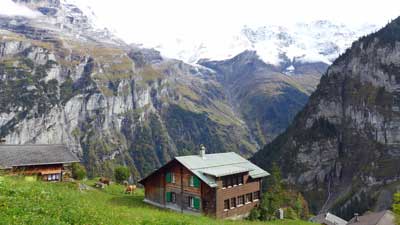
Zurich and Geneva are pleasant but dull. The good news is that Switzerland is packed with amazing sights and none of them are the big cities. If you aren’t 100% locked in yet, please read the article below and I think you’ll enjoy it.
Is the Swiss Travel Pass a good deal? Here's the short version
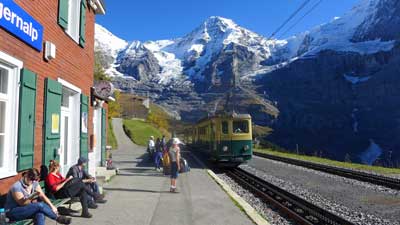
The bottom line is that the scenery, train journeys, and cable car rides in Switzerland are stunning and not found anywhere else in the world. They are also quite expensive if you pay for them one at a time. So no matter how you visit Switzerland, you are going to be paying quite a bit, or skipping the absolute best things that you’ve come there to see.
With good planning it’s quite easy to get great value out of a Swiss Travel Pass, but it might be a poor choice for those who don’t like to plan ahead. You can easily do a scenic train ride and a cable car in the same day, and still have time to do a scenic hike in the process.
First class or second class? Good news for most people
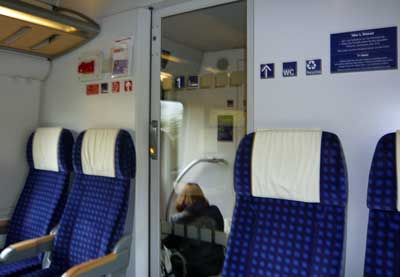
That said, Swiss Trains are literally the nicest in Europe and even the Second Class seats and carriages are nicer and roomier than trains in neighboring countries. The First Class seats are larger and nicer with only 3 across the cabin instead of 4, but honestly Second Class is perfectly comfortable for almost everyone.
Again, First Class on European trains like this is generally popular with business travelers where the company is paying and they need to get work done during the ride, and also senior citizens who don’t want to worry about a carriage full of backpackers. For most of the rest of us, Second Class is more than comfortable enough and the seat width and legroom compare to business-class airline seats. I’m a big and tall guy and I almost always travel in Second because it’s plenty comfortable enough and all the seats arrive at the same time anyway.
The longer you'll be in Switzerland, the better deal a Swiss Travel Pass will be
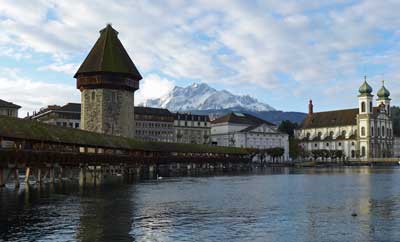
In other words, if you are staying 5 days or fewer, you have to do the math to determine your best option. But if you are spending even 6 or 7 days in Switzerland then the 6-day or 8-day Pass is almost guaranteed to be a great deal and your best choice. Once you have a Swiss Travel Pass you’ll absolutely love the ability to just hop on any train (excellent trains, always on time) and most boats and cable cars without having to worry about the cost. The per-day cost of an 8-day Pass even if you only use 6 of those days is about CHF65, and Switzerland is filled with amazing train rides and boats and cable cars that can get you that much value before noon each day.
Schilthorn (50% discount) and Jungfraujoch (25% discount) are cheaper with a Swiss Travel Pass
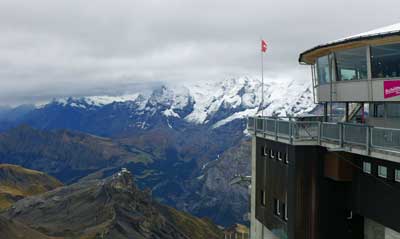
Both of those peak experiences are extraordinary and different from each other. Even so, compared to Jungfraujoch, Schilthorn is also faster and more comfortable on the way up and down. You can enjoy an excellent visit to Schilthorn in 4 hours or so (or a bit longer if you eat at the spinning Piz Gloria restaurant at the top), while a visit to Jungfraujoch requires closer to 6 hours.
NOTE: Schilthorn closes for maintenance for a week or two in late November most years.
Consider the Swiss Half-Fare Card instead
If you AREN’T going to be doing two or more of the long (and expensive) scenic train trips, you will get much better value out of the Swiss Half-Fare Card, which is explained a bit below.
Mt Rigi, near Lucerne, is 100% covered by the Swiss Travel Pass
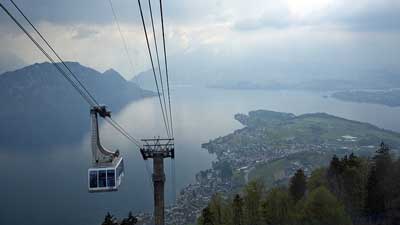
Is a Swiss Travel Pass right for you?
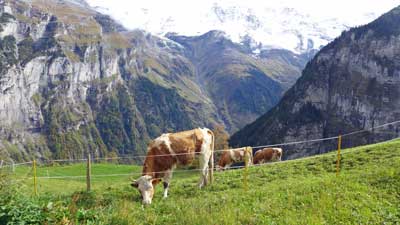
Most people only visit Switzerland for 5 or 6 days at most, so the 3-day and 4-day passes are the ones to focus on. But if you are staying for 8 days or more, those longer passes are almost certainly a great deal for you.
Long story short, if you plan on doing 2 of the more expensive scenic trains and the Jungfraujoch railway or the Schilthorn cable car, then the pass will save you money. Switzerland is expensive, but it’s worth it, and the travel pass can help make it a bit more affordable.
What the Swiss Travel Pass includes
- Free rail travel on normal trains and most scenic trains
- Discounted travel (about 50%) on popular tourist mountain trains
- Discounted travel (about 50%) on popular tourist cable cars
- Free travel on public transport in 75 towns and cities
- Free entry to around 500 museums in Switzerland
The Swiss Travel Pass covers the fare on the most popular scenic and panoramic trains. You can choose a normal seat in a regular carriage for no additional cost, but there is a supplement of CHF8 to CHF49 for a reserved seat in one of the special panorama carriages on these routes.
Prices of the 2024 Swiss Travel Pass
1st Class
- Adult 3-day Pass: CHF389
- Youth (4 to 25) 3-day Pass: 274
- Adult 4-day Pass: 469
- Youth (4 to 25) 4-day Pass: 330
- Adult 6-day Pass: 602
- Youth (4 to 25) 6-day Pass: 424
- Adult 8-day Pass: 655
- Youth (4 to 25) 8-day Pass: 469
- Adult 15-day Pass: 723
- Youth (4 to 25) 15-day Pass: 512
2nd Class
- Adult 3-day Pass: CHF244
- Youth (4 to 25) 3-day Pass: 172
- Adult 4-day Pass: 295
- Youth (16 to 25) 4-day Pass: 209
- Adult 6-day Pass: 379
- Youth (16 to 25) 6-day Pass: 268
- Adult 8-day Pass: 419
- Youth (16 to 25) 8-day Pass: 297
- Adult 15-day Pass: 459
- Youth (16 to 25) 15-day Pass: 328
Swiss Travel Pass Flex
This version costs a bit more, but you don’t have to use the travel days consecutively. It’s a great option for anyone who won’t be taking longer train rides each day.
- Adult 3 Flex days in 1 month (1st Class): CHF445
- Adult 3 Flex days in 1 month (2nd Class): 279
- Adult 4 Flex days in 1 month (1st Class): 539
- Adult 4 Flex days in 1 month (2nd Class): 339
- Adult 6 Flex days in 1 month (1st Class): 644
- Adult 6 Flex days in 1 month (2nd Class): 405
- Adult 8 Flex days in 1 month (1st Class): 697
- Adult 8 Flex days in 1 month (2nd Class): 439
- Adult 15 Flex days in 1 month (1st Class): 755
- Adult 15 Flex days in 1 month (2nd Class): 472
Where to buy the Swiss Travel Pass
The Swiss Half-Fare Card – A better option for many visitors
Far less confusing than the Swiss Travel Pass, you can instead get a Swiss Half-Fare Card, and it will be a better deal for many travelers. The price is lower and it’s much easier to do the math, and the discounts are greater on some things as well.
- Swiss Half-Fare Card for 30 days: Adults – CHF120 or US$129
What you get:
Those who buy the Swiss Half-Fare Card will get 50% discount on all trains, buses, and boats in Switzerland for up to 30 days, as well as 50% off all public transportation in 75 cities and towns.
>>>Buy the Swiss Half-Fare Card
Why the Half-Fare Card is a better deal for many
While the Swiss Travel Pass is a great deal for those doing many of the expensive scenic journeys and mountain sights within a few days, it’s not good value for those who are doing fewer of the expensive trips and/or those who are staying longer. Also, the Swiss Travel Pass only provides a 25% discount on the amazing Jungfraujoch Railway, which costs between CHF120 and CHF224 return depending on your starting point, while the Half-Fare Card provides a 50% discount.
The math is simple as well. You can just add up the cost of the trains, boats, and buses you’ll be taking while in Switzerland, and if the total is more than CHF240 or so, the Half-Fare Card will save you money.
Example itinerary:
- Zurich to Interlaken train (2nd Class): CHF50
- Schilthorn Cable Car: CHF112
- Jungfraujoch railway from Interlaken: CHF205
- Interlaken to Lucerne train (2nd Class): CHF33
- Mt Rigi roundtrip from Lucerne: CHF84
- Engelberg (near Lucerne) to Mt. Titlis Cable Car: CHF92
- Lucerne to Zurich train (2nd Class): CHF25
Total per person: CHF601
Total with Half-Fare Card (including price of card): CHF420.50
It would be tough to do all of those things in 4 days, although it is possible. If you bought a 4-day Swiss Travel Pass here is how it adds up:
4-Day Swiss Travel Pass: CHF259
Supplements for Schilthorn, Jungfraujoch, and Mt. Titlis: CHF203.25
Total cost: CHF462.25
Bottom line on the Swiss Half-Fare Card
Since the Half-Fare Card lasts 30 days and provides a larger discount on Jungfraujoch, it is better value for visitors who want to include that scenic top-of-Europe rail journey on their trip. The discounts also add up more quickly on Schilthorn and Mt. Titlis trips, just to name two examples, and you don’t have to take many longer rail journeys to get value out of the Half-Fare Card.
Swiss Saver Day Pass (A one-day unlimited travel pass)
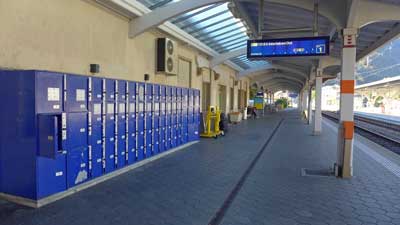
If you buy the Saver Day Pass at least 21 days in advance (and up to 60 days in advance) the 2023 cost is:
- 2nd Class (with Half Fare Card): CHF29
- 1st Class (with Half Fare Card): CHF82
- 2nd Class (with no Half Fare Card): CHF52
- 1st Class (with no Half Fare Card): CHF97
Once you research the normal cost of Swiss train fares you’ll see that the above prices are a very good deal for anyone riding more than 150 kilometers or so in a day. If you are just going, for example, from Zurich to Lucerne or Interlaken on a day, it’ll be cheaper to just buy that ticket individually. But if you are going from Geneva or Montreux to Interlaken or Lucerne then the Saver Day Pass will be much cheaper. Better still, you can use a Saver Day Pass to go from Interlaken to Geneva and back on the same day on the Goldenpass line and returning on the faster train through Bern, and it will still all be included for free.
If you don’t buy a Saver Day Pass at least 14 days in advance it’s more expensive, and if you only buy 1 to 3 days in advance it’s VERY expensive, so the key is to buy early. This is all confusing, but the Saver Day Pass should be a great option for many people only in Switzerland for one to three days.
Popular Swiss panorama scenic trains
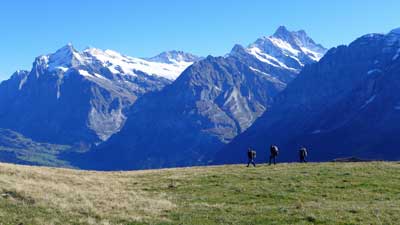
- Glacier Express
- Route: Zermatt to St. Moritz
- Train type: Panorama
- Journey time: 8 hours 3 minutes
- Distance: 291km
- 1st Class fare: CHF272
- 2nd Class fare: CHF159
- Compulsory seat reservation fee: CHF44 or 49
- Supplement for Swiss Pass holders: 13 to 33 for panorama carriage
- Bernina Express
- Route: Chur to Tirano and Lugano
- Train type: Panorama and bus
- Journey time: 4 hours 13 minutes and 3 hours 10 minutes
- Distance: 148km and 90km
- 1st Class fare: CHF113
- 2nd Class fare: CHF66
- Compulsory seat reservation fee: CHF32
- Supplement for Swiss Pass holders: 10 to 14 for panorama carriage
- GoldenPass Line
- Route: Lucerne to Montreaux
- Train type: Panorama
- Journey time: 5 hours 8 minutes
- Distance: 191 km
- Prestige Class fare: CHF131
- 1st Class fare: CHF96
- 2nd Class fare: CHF56
- Supplement for Swiss Pass holders: 8 to 15 for panorama carriage
- Gotthard Panorama Express (formerly Wilhelm Tell Express)
- Route: Lugano or Locarno to Lucerne
- Train type: Panorama and boat
- Journey time: 5 hours 21 minutes
- Distance: 182 km
- 1st Class fare: CHF164
- 2nd Class fare: CHF135
- Supplement for Swiss Pass holders: 39 to 49 for panorama carriage
- Swiss Chocolate Train
- Route: Montreux to Broc round trip
- Train type: Panorama or First Class
- Journey time: X hours X minutes
- Distance: 82 km
- 1st Class fare: CHF99
- 2nd Class fare: 89
- Supplement for Swiss Pass holders: 39
Popular Swiss scenic and theme trains
The scenic trains below are also extremely popular as sightseeing journeys rather than just as transportation, but can be used as both.
- Jungfraujoch round trip
- Route: Interlaken to Jungfraujoch
- Train type: special mountain train
- Journey time: 4 hours 41 minutes, round trip, plus time on top
- Distance: 73 km
- 1st Class fare: N/A
- 2nd Class fare: CHF224
- Supplement for Swiss Pass holders: 147 (so, a saving of CHF77)
- Gornergrat Railway
- Route: Gornergrat Railway
- Train type: Cog railway
- Journey time: 44 minutes return
- Distance: 10 km
- 1st Class fare: N/A
- 2nd Class fare: CHF90
- Supplement for Swiss Pass holders: 45
- Rigi round trip
- Route: Lucerne to Rigi
- Train type: Cog railway
- Journey time: 3 hours 25 minutes, plus time at the top
- Distance: 58 km
- 2nd Class fare: CHF78
- Supplement for Swiss Pass holders: None (this one is free with the pass)
- Mt Rigi Excursion (one-way and walk down)
- Route: Lucerne to Mt Rigi
- Train type: cogwheel train and/or cable car
- Journey time: 45 minutes up
- 1st Class fare: N/A
- 2nd Class fare: 49
- Supplement for Swiss Pass holders: 0
- Lotschberg Mountain Route and Centrovalli
- Route: Bern to Locarno
- Train type: Narrow gauge
- Journey time: 4 hours 40 minutes
- Distance: 212 km
- 1st Class fare: CHF158
- 2nd Class fare: CHF90
- Supplement for Swiss Pass holders: 5
- Jura round trip (Watchmaking Tour)
- Route: Neuchatel through Jura
- Train type: Regular
- Journey time: 3 hours 0 minutes
- Distance: 143 km
- 1st Class fare: CHF168
- 2nd Class fare: CHF108
- Supplement for Swiss Pass holders: 0
- Pre-Alpine Express
- Route: St. Gallen to Lucerne
- Train type: Regular
- Journey time: 2 hours 15 minutes
- Distance: 146 km
- 1st Class fare: CHF83
- 2nd Class fare: CHF47
- Supplement for Swiss Pass holders: 0
- Jura Foot Line
- Route: Basel to Geneva
- Train type: Regular
- Journey time: 2 hours 40 minutes
- Distance: 248 km
- 1st Class fare: CHF132
- 2nd Class fare: CHF75
- Supplement for Swiss Pass holders: 0
Popular Switzerland cable car rides
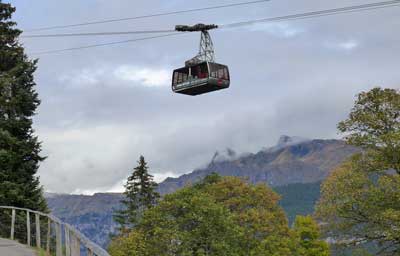
- Schilthorn
- Route: Stechelberg (Lauterbrunnen) to Schilthorn
- Train type: cable car
- Journey time: 1 hour
- 2nd Class fare: CHF108
- Supplement for Swiss Pass holders: 54
- Engelberg to Mt. Titlis cable car
- Route: Engelberg to Mt. Titlis
- Train type: cable car
- 2nd Class fare: CHF96
- Supplement for Swiss Pass holders: 46
The Swiss Travel Pass also includes free museum admission, but…
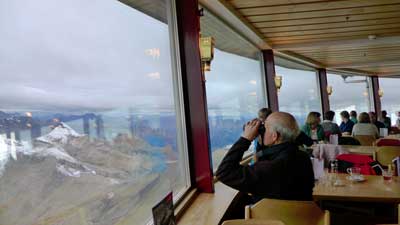
The problem is that the museums are only free on valid travel days, and almost no one would visit more than one or two museums with a Swiss Travel Pass. The trains and cable cars are so expensive that the pass gives very good value to cover those, so you don’t want to waste precious sightseeing time walking through a museum that only costs CHF10 anyway.
In other words, calculate the value of a Swiss Travel Pass on the travel savings only, and if you visit a museum here or there, then great. Most people are better off trying to squeeze in an additional train ride each day, and ignoring the museums. Switzerland is all about the outdoor scenery. As nice as the museums may be, they are not why you are there.
The pass includes free public transport in most Swiss cities
Similar to the free museum part of the offer, it’s best to ignore or minimize the value of free public transportation. It could be helpful in Zurich, but in most other Swiss tourist towns you won’t need much public transport. In fact, in Interlaken, each hotel or hostel guest automatically gets a card for free public transportation within the town (including between the two train stations).
So you might use a ride or two each day on public transport, but that won’t add up to much in terms of value of your Swiss Travel Pass.

Hi Roger,
Thanks for a great website! I see that you’re kind enough to give people specific advice, so I’m going to try too. I’d appreciate it so much if you can help me out. I’ll give you the info first and ask my questions
We are a couple travelling from cologne Germany to Switzerland.
we are planning a trip of 4 days 3 nights and will stay in Interlaken for all the three nights.
first day we will arrive at Basel at morning 6 am and then take train to Interlaken. then my planning is to do goldan pass train on same day. and see the town of zweissimen and montreux.
next will explore luterbunnen, grindelwald and jungfrau.
3rd day will go to luceren and mount titlies.
4th day will take a short trip near to interlaken and in afternoon check out from hotel and going to milan via bernina express.
is my plan is ok? your suggestion is appreciated here and i am so thank full for that.
what is the best option for above plan..4 day travel pass of half fare card.
i am waiting for your early replay because i will start with in 3 days.
Many Thanks in advance.
Your suggestions are highly appreciated.
Jignesh,
Your plan sounds good. The train from Basel to Interlaken will take about two hours, so you might not be in the mood to do the GoldenPass to Montreux AND back on that same day, but the trains are comfortable (even in Second Class) so it’s not a terrible idea. You might also keep your plans open and check the weather. It can be foggy at the top of Jungfrau to the point that it’s not worth going, although that usually only lasts a few hours at a time. In other words, if the weather is clear on the day you arrive you might want to go up Jungfraujoch and then save the GoldenPass for the following day, because it’s nice in any weather.
It’s hard to say which pass will be best without knowing exactly what you’d do. The most expensive thing is Jungfraujoch, which is about CHF200 per person at full price and still CHF150 with a Swiss Travel Pass, but only CHF100 with a Half Fare Card. Or you could go up Schilthorn for free with a Swiss Travel Pass, and that is also spectacular. You’d have to add up the costs of those train rides and see which is the best option. My hunch is that the Half Fare Card would save you most, but it could be close. Let me know if you have any other questions. -Roger
Hi Roger,
Thanks a lot for the quick revert and feedback. Sure. We will chuck out EU Rail then and book Italy and Paris internal trains quickly.
The confusion now lies between Swiss Travel Pass (4 days – 281 CHF) and Half Fare Pass (185 CHF). Will also try to check for Day Saver Pass. It is showing currently at 59 CHF for 1 day.
As mentioned above, our itinerary in Switzerland is as follows:
10th Oct – Plan to reach Wilderswil via Lucerne and Interlaken. Stay in Wilderswil for next 2 days.
11th Oct – Jungfraujoch via Grindelwad and Kleine Scheidegg.
12th Oct – Schilthorn cablecar trip via Lauterbrunned and Stechelberg
13th oct – Travel to Montreux via Golden Pass train and stay in Montreux. Sight-seeing in Montreux
14th Oct – Travel to Paris from Montreux
I have calculated major train travel and excursions within Switzerland. Swiss travel pass costs 467 CHF/person (approx) for trains and excusions mentioned above. Half Fare pass costs 389 CHF (Approx). However, am unaware of the Golden Pass ticket rates from Interlaken to Montreux. Tried to look up various sites. However, could not find rates for Golden Pass
1. Direct Point to Point ticket fare from Interlaken to Montreux (1 way)
2. Fare with Swiss Travel Pass
3. Fare with Half Fare Pass
Thanks a lot. Your suggestions are highly appreciated.
Hi Roger,
Thanks for answering the huge list of queries.
I will list out my query simply. We are a couple (Age 30 both) travelling to Italy (5 days), Switzerland (5 days) and France (3 days).
Italy – Rome (2.5 days), Florence (2 days) Venice (1day)and overnight bus to Zurich on 8th Oct 2019.
We are reaching Zurich on 9th Oct morning and plan to cover Rhine Falls on that day.
10th Oct – Plan to reach Wilderswil via Lucerne and Interlaken. Stay in Wilderswil for next 2 days.
11th Oct – Jungfraujoch via Grindelwad and Kleine Scheidegg.
12th Oct – Schilthorn cablecar trip via Lauterbrunned and Stechelberg
13th oct – Travel to Montreux via Golden Pass train and stay in Montreux. Sight-seeing in Montreux
14th Oct – Travel to Paris from Montreux
15th Oct – Paris sightseeing (Eiffel, Seine river cruise, etc)
16th Oct – Evening flight back to home.
My Question is we are confused between EU Rail, Swiss Travel Pass and Half fare pass. Which should we choose keeping in mind the reduction of costs?
The max train journeys will be from
1.Rome to Florence,
2.Florence to Pisa and back,
3.Florence to Venice,
4.Zurich to Rhine falls and back,
5.Zurich to Wilderswil,
6. Interlaken to Jungfraujoch and back
7. Interlaken to Schilthorn and back (Cable car)
8. Interlaken to Montreux via Golden Pass
9. Montreux to Paris
We are yet to make reservations for and intra-city trains and train from Montreux to Paris. On the verge of finalizing the same.
Would appreciate your suggestions.
Also checked on Junfrau website. It doesn’t give any option for Selecting Swiss Travel card. Only has option for Half day pass or EU Rail.
Cost:
Swiss travel card – 281 CHF
Half fare pass – 185 CHF
Eu Rail pass – 442 Euros
Awaiting your suggestions. Our hotel and flight bookings are already done.
Thanks
Ankit
Ankit,
I’ll try to help with the questions in order.
Eurail Passes cover the city to city trains in Switzerland, but they only get you a 25% discount on the more expensive attractions in most cases. Eurail Passes also require seat reservations for trains within France, and those can be surprisingly expensive. Fortunately, trains within Italy are pretty cheap so a Eurail Pass isn’t usually good value. Florence to Pisa is only around €10 each way, I think.
What I’d recommend is buying your individual train tickets for Italy as soon as possible, and the same for your train to Paris. For Switzerland I’d recommend the Half Fare Card most likely, although it’s hard to say without adding everything up. You could also get a Saver Day Pass for your Schilthorn day and any other day that is going to include several expensive rides. Jungfraujoch is a 25% discount with a Swiss Travel Pass and a 50% discount with the Half Fare Card, so the HFC is the better deal.
The Saver Day Pass is quite cheap if you’ll also have a Half Fare Card, and the earlier you buy it the cheaper it is.
Again, the only way to be sure which is the cheapest method is to check fares on all of the journeys and add them up with each type of pass. Train rides within Switzerland are the same price no matter when you buy (up to 30 days in advance) so you can check the fare for any day and it’ll be the same for your travel days. It could be that the 4-day Swiss Travel Pass is actually cheaper, and if you bought that you’d also be able to hop on other trains or cable cars or boats for free on those days.
The Swiss rail system and the passes are quite confusing, which is why this article gets so many comments. I hope this helps and let me know if you have any other questions. -Roger
Hi, Robert.
Thanks for a great website! I see that you’re kind enough to give people specific advice, so I’m going to try too. I’d appreciate it so much if you can help me out. I’ll give you the info first and ask my questions.
We’re a family of four (2 children under 16) traveling to Switzerland for a weekend in October. Here is our overall itinerary:
Fri 12pm: flight arrives in Zurich
train to Lucerne
see sights
train to Interlaken (Question 1: Is it possible to do just this leg (Lucerne to Interlaken) of the Golden Pass?)
train to Wengen or Murren and stay 2 nights
(My husband really wants to stay put in a small mountain town and take short hikes, maybe go up Schilthorn.)
Sun morning: train to Interlaken
train to Bern
see sights
train to Zurich to catch 4pm flight
My family and I won’t be taking too many train rides, so I wasn’t going to buy a Swiss Travel Pass or even a Half Fare Pass, but I saw that children would be riding free if the adults have those. Question 2: Do children travel free if an accompanying adult has a regular point-to-point ticket?
We’re still 30+ days out from when we will travel. Questions 3&4: Will the Saver Day Pass be our best bet? How do accompanying child fares work for that one?
I hope to hear from you!
Thanks!
Jenny
Jenny,
Thank you for the kind words. I’ll try to help and answer questions in order.
The trains between Lucerne and Interlaken can be part of the Goldenpass, but I don’t think they have the panoramic carriages on that portion so it would just be a normal train. It’s very scenic regardless of which carriage you ride in, so you’ll enjoy it.
I believe ages 6 to 16 have to buy a half price ticket (without needing a Half Fare Card) if riding with adults buying normal tickets. So I think that Swiss Family Card only applies with a pass. Especially if you take the cable car up Schilthorn, you’ll get value out of the Half Fare Card, and probably even if you don’t, so I’d recommend it.
The Saver Day Pass could be good if you go up Schilthorn, with or without a Half Fare Card. I’m not sure about children using a Saver Day Pass. The Swiss system is somehow the most complicated in Europe and it’s hard to figure out all of the rules. I hope this helps. Let me know if you have any other questions. -Roger
October 18- 21, 2019
Hi first timer to Switzerland, I want to visit the Swiss Alps. What place is best Zurich or Geneva and how I shall go about. Thanks.
Nalini,
If you want to know where to go, this article on where to go in Switzerland on a short visit should help a lot. Basically it’s best to focus on the Interlaken area, which is closer to Zurich Airport than Geneva Airport. Let me know if you have any other questions. -Roger
Thank You ever so much!
Hi Roger
What an amzing and informative site you have. Thank You.
Despite reading all of it, I am still a bit confused. Iv been trying to work out the best deal in a very expensive but beautiful country. Mine is just a two day trip for now.
Saturday Arrival – Basel at 09.40 am
Saturday Basel – Interlaken and maybe Lauterbrunnen
Sunday Basel – Lucerne and Mount Rigi round trip
I would be really grateful if you could advise
Thank You 🙂
Archie,
If you’ve only got two days then I think you have a sensible plan. The Lauterbrunnen Valley is arguably the most scenic area in all of Europe and you can do a hike or take one of the cable cars to get a different view. You’ll have to get an early start to reach Lucerne (2 hours by train) and be able to do the Mt. Rigi round trip, but it can be done while on the lake cruise, which leaves from in front of the train station. I’d get a Half Fare Card, especially if you want to take a cable car or two. Let me know if you have any other questions. -Roger
Thank you for this information, but I’m still trying to sort things out. We are flying into Zuerich, and need to go from there to Zermatt the same day. I went to the raileurope.com website, and chose our dates (22 December, about 2pm) and put in Zuerich Flughafen as the origin and then Zermatt as the destination, indicating that we have a 2nd Class Swiss Travel Pass.
The itineraries that came back said “The fares you requested are not available with the selected rail pass. Please select a regular fare and proceed to the next step.” and then it quoted a price for 2 adults and an 11-year old child.
Am I missing what the Swiss Travel Pass is good for? I mean… paying over $800 for the passes (2 adults plus the free family/child) and then still having to pay $359 to get from Zuerich to Zermatt? I don’t get it.
Holly,
Believe it or not, the idea behind rail passes such as the Swiss Travel Pass is that you can literally just hop aboard a train and find an empty seat. Then you show the pass to the ticket person as they come around and they will validate your pass and move along. That said, the Swiss Rail Pass does NOT allow free travel on some of the mountain tourist trains, including some in the Zermatt area. And you have to pay for a seat reservation to ride in a panoramic carriage on selected scenic trains.
Swiss trains are rarely very crowded, except for sometimes the morning departures between the big cities that are popular with business travelers. If you get very unlucky you might have to stand for a stop or two on your train from the airport, but then you’ll be able to find a seat. Most likely there will be seats available. Let me know if you have any other questions. -Roger
hi roger,
we are 2 adults and 2 kids (13 & 4 years).Travelling on october 2nd.
our itinerary is (3 nights lucern & 2 nights lauterbrunen)
day 1- arrival zurich airport and stay in lucern (reaching at 4 in the evening)
day2- mt titlis and lucern city tour
day 3- zurich city tour(2 hrs travel by train) from lucern
day 4 – check out and go to lauterbrunen – Jungfraujoch(stay in lauterbrunen)
day 5 lauterbrunen,grimmelwald,murren
7th check out and head to rome (tickets booked)
please suggest which is the best travel pass we should take..
should we take swiss travel pass 4 days or half fare card or do we have family card…
eagerly waiting for your reply,
regards,
uma
Uma,
Your plan looks quite good. My only bit of advice would be about spending a day in Zurich. It’s a nice enough city, but it’s actually kind of dull compared to most large European cities, and it’s a HUGE step down from Rome, for example. Switzerland is blessed with Europe’s best scenery and several of Europe’s most lackluster cities. I’d spend that day in Lucerne or go to Interlaken early.
It’s hard to say exactly what pass is best without adding up everything you’ll be doing and comparing the costs with each method. That said, my hunch is that you’ll be best off with a Half Fare Card for each adult and of course the free Swiss Family Card to get the children to ride free. If you were doing Schilthorn instead of Jungfraujoch it might be different since Schilthorn is fully covered and Jungfraujoch only gets a 25% discount with a Swiss Travel Pass. Let me know if you have any other questions. -Roger
Hi, Roger
Was looking for information about swiss travel pass which led me here.
Would be grateful for you to suggest places to go during winter to make full use of a 8-day pass.
Day 1: Reach Zurich
Day 2: Zurich
Day 3: Zurich to Lucerne
Day 4: Lucerne
Day 5: Lucerne to Montreux
Day 6: Montreux
Day 7: Montreux to Zermatt
Day 8: Zermatt to Zurich (Specially organised this to board the Glacier Express from Zermatt to Chur then Zurich)
Day 9: Zurich
Day 10: Flight from Zurich back home
Hotels are booked for Lucerne and Zurich, but can rearrange trips where hotel isnt booked.
Thank you for helping!
Ben,
I actually have all of my best itinerary suggestions in my main article on where to go in Switzerland. The short version is that most visitors are best off limiting their time in the larger cities such as Zurich and Montreux, and that the Interlaken area is home to the greatest concentration of Switzerland’s best sights and scenery. Lucerne is also fantastic. Have a look at that article and hopefully you’ll be able to figure out which places seem most interesting to you. I’m happy to help with more information if you need it. -Roger